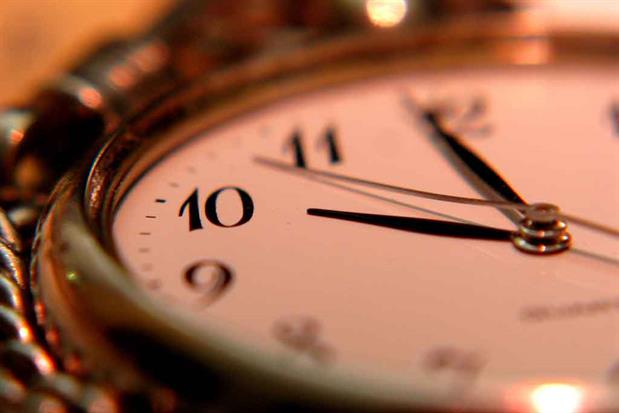Fifty per cent of Brits in a recent survey agreed "there aren’t enough hours in the day to do everything I’d like to do" (that figure was 61% for students and 44% for the unemployed).
Modern technology is only making it worse too. Smartphones are widening the gap between reality and perception by making us feel like time is speeding up. Psychology professor Dr Aoife McLoughlin wrote: "Technology primes us to increase that pacemaker inside of us that measures the passing of time".
Deadlines seem to be getting shorter and shorter to compound the issue. In theory, shorter deadlines shouldn’t be a problem because of Parkinson’s Law, which states that however long we have for a task is however long it’ll take. But this only works for linear problem solving tasks like production or computation. The really bad news is that the opposite is true for creativity.
A recent HBR article (Martman, 2015, "To Get More Creative, Become Less Productive") suggested that this is a serious issue if we want to be creative under pressure. "Productive people move through tasks in a systematic way. Creative enterprises rarely involve steady and measurable progress. Instead, being creative involves trying lots of different possibilities, struggling down several blind alleys before finding the right solution". Or as Dan Wieden once said, you’ve got to get lost in the fog.
A paper from Harvard Business School – "Time Pressure and Creativity" – showed that time pressure actively prevents creative thinking. They found that under extreme time pressure your ability to think creatively drops by 45%: "Rather than jolting people into creative insight, [time pressure] may instead make that insight all-the-more elusive."
So, time pressure is great for analytical or computational tasks but it is thoroughly crap for creative folk. But we work in a deadline business – so what’s to be done?
We can’t create time. Or bend time. And until they invent one of those Hermione Granger time-turners we can’t make it run backwards either. But we can change our relationship with it. It is my contention that by looking at some of the psychology of time and treating it differently we can start to make it work in our favour.
1. Embrace fatigue
It sounds weird. But we go through peaks and troughs of alertness throughout our days. Post-lunch lulls, early morning tiredness, late-night drowsiness. Instinct and logic would suggest that it would be best to tackle tasks when we are at our most alert, right? Wrong. Science shows that when we’re tired our brains are less vigilant and this allows abstract ideas to form. So, the science tells us to tackle analytical tasks when you’re alert and creative ones when you’re a bit on the tired side.
2. Daydream
Some areas of your brain that are involved in creative problem solving only activate when you let your mind wander. This is called "default mode". In fact, studies have revealed that people with less mental stimulation during periods of downtime are 40% better at solving creative problems afterwards. Let your mind wander.
3. Chunk it up
The human brain is incapable of multitasking – and that’s the same for men and women. Our brains can’t divide our conscious attention; we can only transfer it from task to task. Multi-tasking means we never get far enough down the path on any single task. Charles Dickens wrote every day in the mornings and then walked in the afternoons. Allocate blocks of time to single tasks and don’t let it slip.
4. Make a start
Did you know that your brain dedicates a disproportionate amount of energy to incomplete tasks? This is called the Zeigarnik Effect – things that feel incomplete create a mental tension that compels you to finish them. Your sub-conscious will keep working even after you stop physically working on a task. So, make a start and the need to ease mental tension will do the rest.
5. Ditch your phone
Just being around your smartphone slows you down – even if it’s turned off or over. If you have your phone on you as you read this then you’d have had 7% stronger problem solving abilities and 11% higher attention if you’d left it in another room. So before you start on something, lose the phone.
6. Pick up a pen
You are significantly better at understanding something when you write things down by hand. This is an effect called Mental Lifting, where the slowness of writing by hand forces you to engage more deeply on the task. So, if you’re staring at a screen and it’s ain’t happening, pick up a pen instead.
7. Stop being busy
Time pressure leads to anxiety. Did you know that one of the best ways of combatting time-induced anxiety is reframe it as excitement? Don’t be "busy". Try calling it "active" or "in-demand" instead. Reframing & reframing matters.
8. Forgive thyself
Did you know that forgiving your own procrastination has been proved to make you less likely to procrastinate in the future? Studies showed that students who forgave themselves for putting off revision in a first exam did much better in the second exam. Those that dwelt on the lack of revision were 25% more likely to procrastinate again! So, don’t beat yourself up for putting it off. We all do it. As New Yorkers say, forget about it.
So there you go. Eight tips to make you worry less and therefore get more creative. And if you want a really simple final one, take your watch off when you get home at night. You are no longer a slave to time, so refuse to be shackled by it. I promise you you’ll feel more relaxed just by this simple action.
Right, I’ve taken up too much of your time already. Shouldn’t you be working? Now you’ve got the time.
Kevin Chesters is the chief strategy officer at Ogilvy.


